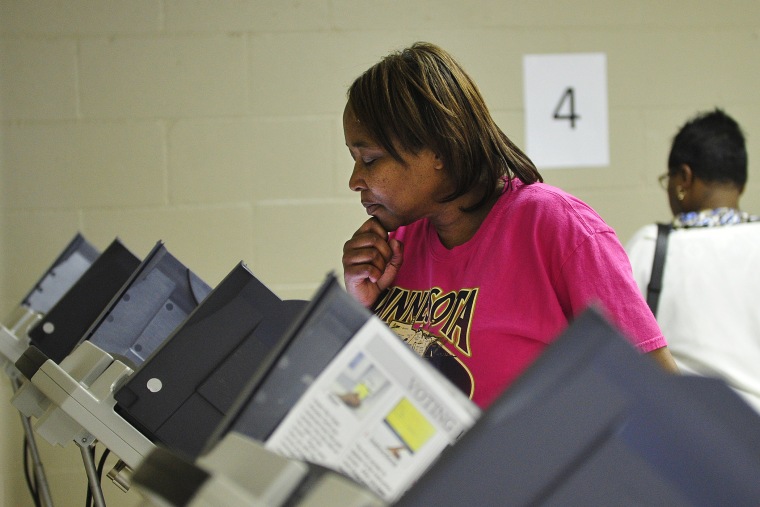In Georgia, minority voices are finally threatening to be heard at the ballot box after more than a century of being marginalized by the political process. And conservatives are ramping up a campaign to stop them.
With the state hosting a tight U.S. Senate race, Democratic hopes of holding onto the chamber could depend on which side prevails in the battle over minority voting.
Driving that battle are stark numbers: Georgia, which has seen big demographic shifts over the last decade, has nearly 900,000 unregistered minority voters, around 80% of whom would be expected to vote Democratic. Mitt Romney’s 2012 margin of victory over President Obama in the state was just 305,000 votes.
Behind those numbers is a demographic shift comparable to Texas’s more celebrated transformation. A huge influx this century of African-Americans from other states, and strong growth in the Hispanic and Asian populations, have combined to put Georgia’s whites at risk of minority status. By last year, they made up just 55% of the state’s total population, down from 72% in 1980. Even Republicans recently hired a "minority engagement director," The New York Times reported.
It's been a long road. In the aftermath of the Civil War, numerous black Georgians served as state lawmakers or delegates to the constitutional convention. But starting in the 1870s, white Democrats took control of the state's politics, and blacks were disenfranchised in 1908. Since the civil rights era, white Georgians have shifted en masse from the Democratic Party to the GOP, leaving African-Americans once again on the wrong side of the state's racially polarized politics.
The shifts have Democrats emboldened. Georgia hasn’t elected a Democrat to the Senate since 2000, but polls show Michelle Nunn, this year’s Democratic candidate, virtually tied with Republican David Perdue. Gov. Nathan Deal, a Republican, also is facing a strong challenge from Democrat Jason Carter.
On Sunday, civil rights icon Rep. John Lewis (D-Ga.) urged congregants at a black church outside Atlanta to turn out this fall—part of a nationwide push to stoke black turnout organized by the Congressional Black Caucus. Michelle Obama—in some circles a bigger draw these days than her husband—recently visited the Peachtree State to mobilize black voters.
Republicans sound worried. In a post on Facebook earlier this month, state Sen. Fran Millar noted the first lady’s visit, before complaining about a plan to offer Sunday voting at a DeKalb County location in an area “dominated by African-American shoppers.” Responding to outraged commenters, Millar said he simply would “prefer more educated voters" to “an increase in the number of voters.”
But the tension has flared most sharply over a splashy investigation conducted by Georgia’s Republican Secretary of State, Brian Kemp, into a voter registration group founded by House Minority Leader Stacy Abrams, a black Democrat. Kemp was appointed secretary of state in 2010 by then-Governor Sonny Perdue, a cousin of David Perdue, the GOP’s Senate candidate. Perdue’s campaign seized on Kemp’s probe to declare that Nunn is “tied closely to voter fraud allegations.”
But after generating headlines, the investigation has largely fizzled, as many expected from the start. At a public hearing Wednesday, Kemp’s office said the allegations involved just 25 out of the 85,000 forms submitted by the group, the New Georgia Project (NGP). And Jared Thomas, a spokesman for Kemp, told msnbc that investigators had no evidence suggesting that NGP as an organization was responsible for the fraud. “We have not found anything that leads us to believe that this was orchestrated by leadership of the group,” Thomas said.
That suggests that any fraud was perpetrated by employees of NGP. Employees of other voter registration groups have in the past filled out fraudulent forms because they were being paid per form they handed in. But as Abrams has noted, state law requires her group to hand in to election administrators all the forms it collects, even if it’s aware of problems. And Abrams has said she has worked closely and cooperatively with Kemp’s office about her group’s process since June.
Speaking to msnbc last week, Abrams—the first black leader of either party in the history of the Georgia House—called the probe a “witch-hunt,” a “fishing expedition,” and "overly broad.”
Abrams said her group is continuing to register new voters, and has a goal of 120,000 applications before election day.
Kemp’s investigation isn’t the only organized effort to make it harder for Georgia’s minorities to vote. Last year, the U.S. Supreme Court neutered a key provision of the Voting Rights Act, which had required Georgia and most other southern states to submit any changes to election laws to the U.S. government for approval before they went into effect. Since then, the Peachtree State has moved ahead with several schemes to change the rules in a way that reduces black political power. And civil rights groups fought off a push by Georgia Republicans to cut early voting in municipal elections.
